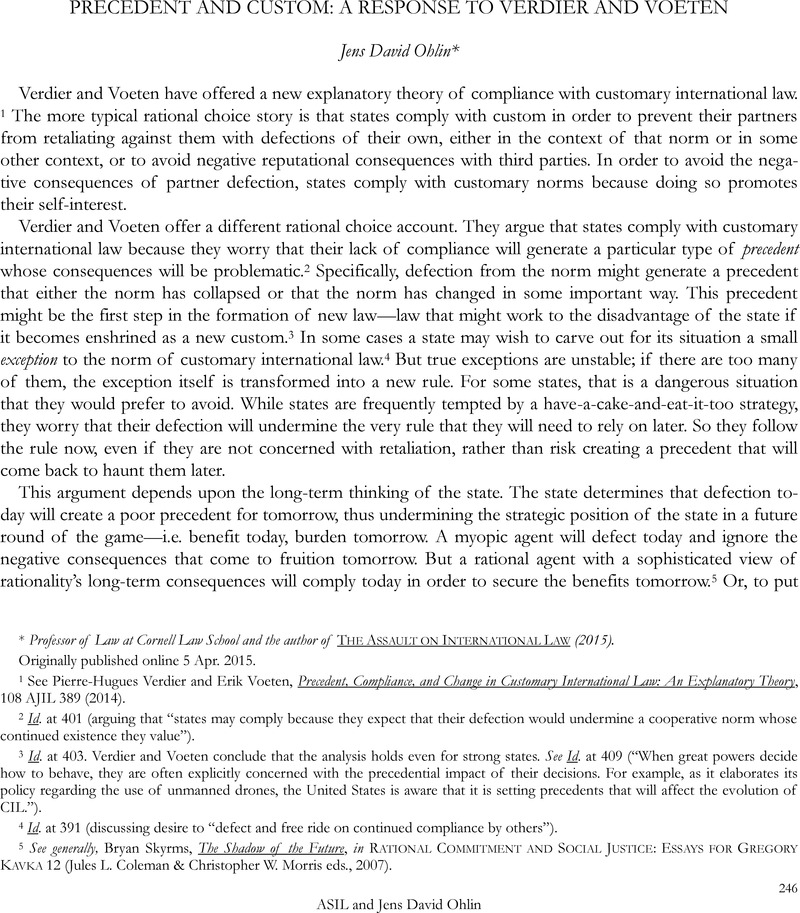Article contents
Precedent and Custom: A Response to Verdier and Voeten
Published online by Cambridge University Press: 20 January 2017
Abstract

- Type
- Symposium: Pierre-Hugues Verdier and Erik Voeten, “Precedent, Compliance, and Change in Customary International Law: An Explanatory Theory”
- Information
- Copyright
- Copyright © American Society of International Law 2014
References
1 See Verdier, Pierre-Hugues and Voeten, Erik, Precedent, Compliance, and Change in Customary International Law: An Explanatory Theory, 108 AJIL 389 (2014)Google Scholar.
2 Id. at 401 (arguing that “states may comply because they expect that their defection would undermine a cooperative norm whose continued existence they value”).
3 Id. at 403. Verdier and Voeten conclude that the analysis holds even for strong states. See Id. at 409 (“When great powers decide how to behave, they are often explicitly concerned with the precedential impact of their decisions. For example, as it elaborates its policy regarding the use of unmanned drones, the United States is aware that it is setting precedents that will affect the evolution of CIL.”).
4 Id. at 391 (discussing desire to “defect and free ride on continued compliance by others”).
5 See generally, Skyrms, Bryan, The Shadow of the Future, in Rational Commitment and Social Justice: Essays for Gregory Kavka 12 (Coleman, Jules L. & Morris, Christopher W. eds., 2007)Google Scholar.
6 See, e.g., Guzman, Andrew T., Saving Customary International Law, 27 Mich. J. Int’l L. 115 (2005)Google Scholar; Norman, George & Trachtman, Joel P., The Customary International Law Game, 99 AJIL 541 (2005)CrossRefGoogle Scholar; Goldsmith, Jack L. & Posner, Eric A., A Theory of Customary International Law, 66 U. Chi. L. Rev. 1113, 1115 (1999)CrossRefGoogle Scholar.
7 Verdier and Voeten, supra note 1, at 432 (concluding that states do not break or honor human rights obligations on the basis of reciprocity, but “[t]hat said, many states appear to be preoccupied with precedent”).
8 For a study of compliance with the laws of war, see generally James D. Morrow, Order within Anarchy: The Laws of War as An International Institution (2014).
9 On the planning theory of human agency, see Michael E. Bratman, Intention, Plans and Practical Reason (1987).
10 Jens D. Ohlin, The Assault on International Law (2015).
11 This conclusion is demonstrated by Gauthier’s work. See Gauthier, David, Rethinking the Toxin Puzzle, in Rational Commitment And Social Justice: Essays For Gregory Kavka 47, 57 (Coleman, Jules L. & Morris, Christopher W. eds., 2007)Google Scholar; Gauthier, David, Commitment and Choice: An Essay on the Rationality of Plans, in Ethics, Rationality, and Economic Behavior 217, 221 (Farina, Francesco et al. eds., 1996)Google Scholar.
12 See Gauthier, David, Assure and Threaten, 104 Ethics 690 (1994)CrossRefGoogle Scholar.
13 See Ohlin, supra note 10, at 119-153 (2015).
- 2
- Cited by


